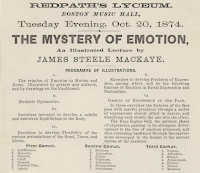In our mediated hyperculture, it is difficult to imagine how listening to a lecture could be a form of popular entertainment. Not so, however, in the 19th century, where oratory was big business, involving legions of travelling celebrity speakers and regular, large, and eager audiences. As Harper’s Monthly explained in 1855: “New England is dreadfully belectured. Every evening of the week usually brings some 'entertainment' of the kind, as it is courteously termed. The Mercantile Library of Boston, like an immense corporation doing a tremendous business, runs, as it were, two express trains of lectures during the week.”
Ordinary people frequently sought out speakers, reflecting in their diaries about they heard. In fact, they tended to treat public lectures and speeches as they did sermons: sources of life-changing wisdom. A good lecture was one that galvanized the audience, moving them to act. Thomas Augst has written about this use of oratory as a "technology of the self" in The Clerk’s Tale; what interests me is the extent to which such attention might also be characterized as a form of fandom. Relying on the framework of authorship, the history of oratory is often about the power of speakers, but the other side of that power, of course, is the enthusiastic embrace of listeners.
Political oratory was especially meaningful to its audiences in the 19th century. Samuel P. Orth, (“Government By Impulse, Atlantic Monthly, Volume 100 (July 1907): 1-9) summed it up in the context of William Jennings Bryan’s electrifying—but failed—run for president in 1896:
“The American people love their orators. No other people flock as we do to hear sonorous sentences, well-rounded periods, plausible epigrams, multiplied alliteration, and picturesque metaphors. Nowhere else is a resonant voice so potent as in America. Where else in the world, and in history, could be reenacted the scene that witnessed the nomination of an obscure newspaper reporter for the highest office in the gift of a great nation, because of the full orotund of his voice and the appealing figures of his speech? And what greater tribute could be paid to man than was vouchsafed by the assembled thousands gathered from every state at the eastern gateway of the continent, to greet the necromancer of words as he returned to his native land from a world tour? It is not Bryan the statesman, nor Bryan the sage, nor Bryan the politician, but Bryan the orator, whom the masses adore.
The political orator exercises a mystic sway. The enchantment of the human voice is singularly complete over the average American audience. They will stand in downpouring rain for hours, they will fill the largest hall to suffocation, they will gather in unwieldy crowds at monster mass meetings, to hear a mighty wielder of phrases; they will get out of bed at unseemly hours in the morning, or stay up until midnight, to hear a stump speech from the rear platform of the train that bears the favored orator from town to town in a journey of triumph.
And why do we love to hear our orators? It is not merely idle curiosity, for curiosity is transitory; it vanishes speedily, once that it is satiate. Nor is it surely for the logic or the wisdom or the originality of the orator. The public speaker who has a reputation for syllogisms or philosophy speaks to empty benches. We love to hear our political orators, not for what they teach, but for what they inspire. They make us enthusiastic. We love the thrills they give, the impulses they radiate. The function of the stump speaker is not conversion or conviction, but stimulation. In some degree all republics have magnified the gift of speech. The spoken word is the medium of legislation and agitation. From the village debating club to Congress, volubility is the much sought gift.”
There is certainly something about the ritual occasion of political speech that evokes strong feelings of civic participation. It suppose that's why I still watch my political party's national convention on television every four years. Some of what you see is so old-fashioned, it seems almost a mockery of the past (plastic skimmer hats and balloons, really?). However, it's still part of the political process, and I feel like I need to be “in” it even if not “at” it. There is also the fact that democracy remains fundamentally a persuasive art, and in politics, speaking is still the primary medium of action. Public political speech is almost always a speech act--directing, declaring, and committing. Most of all, though, political rhetoric demands response. The situation of an eloquent leader, poised before an expectant audience, is a social drama with potential legislative consequences. Most of the time, hearing a good political speech reminds people of their values, their ideal strivings, and new possibilities to consider. Sometimes, however, when audiences are ready to do something with the words they hear, oratory sparks action.
The State of the Union is Tuesday.



No comments:
Post a Comment